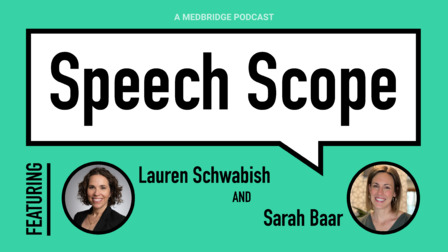Working Memory: How Can I Address This in a Meaningful Way?
Presented by Sarah Baar and Lauren Schwabish

12-Month Subscription
Unlimited access to:
- Thousands of CE Courses
- Patient Education
- Home Exercise Program
- And more
Speech Scope Episode 8: Working Memory: How Can I Address This in a Meaningful Way?
Lauren Schwabish, MS, CCC-SLP, joins Sarah Baar to discuss working memory in brain injury treatment. With more than 24 years of experience, Lauren shares key insights from research and practical strategies for clinicians. Learn how to make working memory treatment more meaningful and effective in everyday practice.
Learning Objectives
- Interpret the evidence around treatment of working memory deficits
- Apply evidence-based, practical strategies to actionably address meaningful working memory treatment
- Solve patient case scenarios involving treatment of working memory in life contexts
Meet your instructors

Sarah Baar
Sarah is a speech-language pathologist in Grand Rapids, Michigan. She has had the opportunity to work in many settings across the continuum, including acute care, acute rehab, home and community, and outpatient therapy, and has been involved in various leadership projects. In 2016, she started the Honeycomb Speech Therapy…

Lauren Schwabish
Lauren Schwabish is the owner of Neuro Speech Services, a private practice based in Northern Virginia specializing in person-centered assessment and treatment of cognitive-communicative disorders related to stroke, brain injury, mild cognitive impairment, ADHD, and other neurologic and neurodegenerative conditions. Lauren…
Chapters & learning objectives
More courses in this series

Is the Clock Drawing Test Still Relevant? Then What?
Sarah Baar and Samantha McDaniel

Severe Global Aphasia: Where Do I Start?
Sarah Baar and Treasyri Williams Wood

INCOG 2.0: How to Manage Cognitive Communication and Social Cognition
Sarah Baar and Penny Welch-West

My Aging Client Loses Their Train of Thought in Conversation—What Can I Do?
Sarah Baar and Alyssa Lanzi

How Can SLPs Think More Broadly About Decisions in Dysphagia Management?
Sarah Baar and Tim Stockdale

Is There Reason to Hope With PPA?
Sarah Baar and Lisa Wauters

What Is an SLP’s Role Related to Home Programs for People With Aphasia?
Sarah Baar and Sarah E. Wallace

Working Memory: How Can I Address This in a Meaningful Way?
Sarah Baar and Lauren Schwabish

What Should SLPs Know About Cancer-Related Cognitive Impairment?
Sarah Baar and Patricia Geels

How Can SLPs and ATCs Work Together for Sports Concussion Management?
Sarah Baar and Tabia Pope

How Can We Help Patients With Functional Voice Disorders Find Their Voice Again?
Sarah Baar and Adam T. Lloyd

How Can Respiratory Muscle Training Impact Neurodegenerative Diseases?
Sarah Baar and Brooke Richardson

AI Speech Therapy: What Ethical Considerations Should I Think About?
Sarah Baar and Nina Benway

Return to Work and TBI: How Can SLPs Help?
Sarah Baar and Peter Meulenbroek

Dysarthria and Life Participation: Where Do I Begin?
Sarah Baar and Carolyn Baylor
